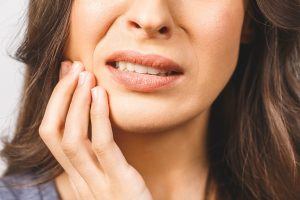 When you ignore most dental health issues, they tend to get worse the longer they remain unchecked. For instance, a minor cavity can grow into a much more severe case of internal tooth infection if it’s given enough time. The same is true with a subconscious teeth-grinding habit, a condition often referred to as bruxism, and the damage that it could potentially cause to all of your teeth. The constant teeth-grinding that’s characteristic of bruxism can put your teeth under an immense amount of pressure and friction. If it remains untreated long enough, your bruxism could cause several more severe problems with your teeth and oral health.
When you ignore most dental health issues, they tend to get worse the longer they remain unchecked. For instance, a minor cavity can grow into a much more severe case of internal tooth infection if it’s given enough time. The same is true with a subconscious teeth-grinding habit, a condition often referred to as bruxism, and the damage that it could potentially cause to all of your teeth. The constant teeth-grinding that’s characteristic of bruxism can put your teeth under an immense amount of pressure and friction. If it remains untreated long enough, your bruxism could cause several more severe problems with your teeth and oral health.
Significantly worn-down teeth
Grinding your teeth together on a consistent basis is bound to wear them down sooner rather than later. When you bite down, your jaws exert an enormous amount of pressure in order to properly bite and chew your food before you digest it. Normally, your teeth are strong enough to withstand biting and chewing your food every day, but without food between them, your teeth are forced to absorb all of that pressure and friction themselves. Before long, the chewing surfaces of your teeth can begin to wear down and change shape, which can create a completely different source of trouble for your oral health and bite function.
Fractures or breaks in your tooth structure
When your teeth’s chewing surfaces wear down, the change in how they meet each other can affect everything from your bite’s balance to the amount of pressure that your other teeth must absorb. It can also make your teeth structurally weaker, and if your unchecked teeth-grinding continues, one or more of them may fracture or break in the process. A fractured or broken tooth is a more obvious problem than a slightly worn-down one, and the discomfort is typically much more intense. Likewise, the threat that the damaged tooth causes can be more severe, and require more extensive treatment to address.
The development of TMJ disorder
Because of the constant teeth-grinding, bruxism can pose several direct threats to your natural tooth structure, but its potential impact on your oral health can include much more. For example, not only do your teeth become damaged from the pressure, but the jaw joints and muscles that power your bite’s function can also suffer under the strain. TMJ disorder describes a dysfunction in your temporomandibular joints, or TMJs, that your lower jaw hinges on. The longer bruxism remains untreated, the more at-risk you may be of suffering damage, inflammation, misalignment, or other forms of dysfunction in your TMJs.
Treat your bruxism as soon as possible
The longer you allow bruxism to go unchecked, the more significant of an impact it can have on your teeth and the rest of your oral health. To learn more, or to schedule a consultation, call Cedar Dental in Cedar Rapids, IA, today at (319) 364-7108.




Recent Comments